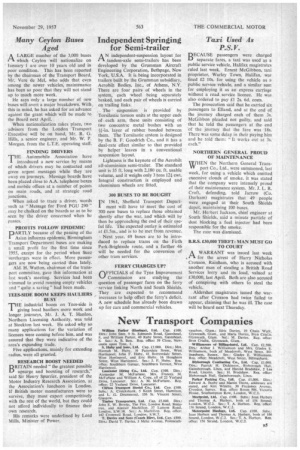Many Ceylon Buses Aged
Page 39

If you've noticed an error in this article please click here to report it so we can fix it.
A LARGE number of the 3,400 buses 1—k which Ceylon will nationalize on January I are over 10 years old and in poor condition. This has been reported by the chairman of the Transport Board, Mr. Vere de Mel, who adds that even among the newer vehicles, maintenance has been so poor that they will not stand up to much more work.
He says only a large number of new buses will avert a major breakdown. With, this in mind, he has asked for an advance. against the grant which will be made to the Board next April.
When nationalization takes place, two advisers from the London Transport Executive will be on hand, Mr. R. G. Hills, a senior engineer, and Mr. W. P. Morgan, from the L.T.E. operating staff.
FINDING DRIVERS
THE Automobile Association have introduced a new service by means of which drivers may be contacted and given urgent messages while they are away on journeys. Message boards have been placed close to A.A. telephone boxes and mobile offices at a number of points on main roads, and at strategic road junctions.
When asked to trace a driver, words such as "Message for Ford PGU 290" inay he chalked on the boards so as to be seen by the driver concerned when he passes.
PROFITS FOLLOW EPIDEMIC DARTLY because of the passing of the
Asian influenza epidemic, Birmingham Transport Department buses are making a small profit for the first time since 1955, except for the period when Suez surcharges were in effect. More passengers are now being carried than lately.
Aid. H. Watton, chairman of the transport committee, gave this information at last week's meeting. Services had been trimmed to avoid running empty vehicles and "quite a saving" had been made.
TEES-SIDE ROOM KEEPS HAULIERS BUSY THE industrial boom on Tees-side is
giving local hauliers more work and longer journeys, Mr. J. A. T. Hanlon, Northern Licensing Authority, was told at Stockton last week. He asked why so many applications for the variation of licences were coming before him, and was assured that they were indicative of the area's expanding trade.
Five applications, mainly for extending radius, were all granted, RESEARCH BOOST NEEDED
BRITAIN needed " the greatest possible upsurge and boosting of research," said Sir Henry Spurrier, president of the Motor Industry Research Association, at the Association's luncheon in London. If British motor manufacturers were to survive, they must export competitively with the rest of the world, but they could not afford individually to finance their own research.
His remarks were underlined by Lord Mills, Minister of Power.




























































































